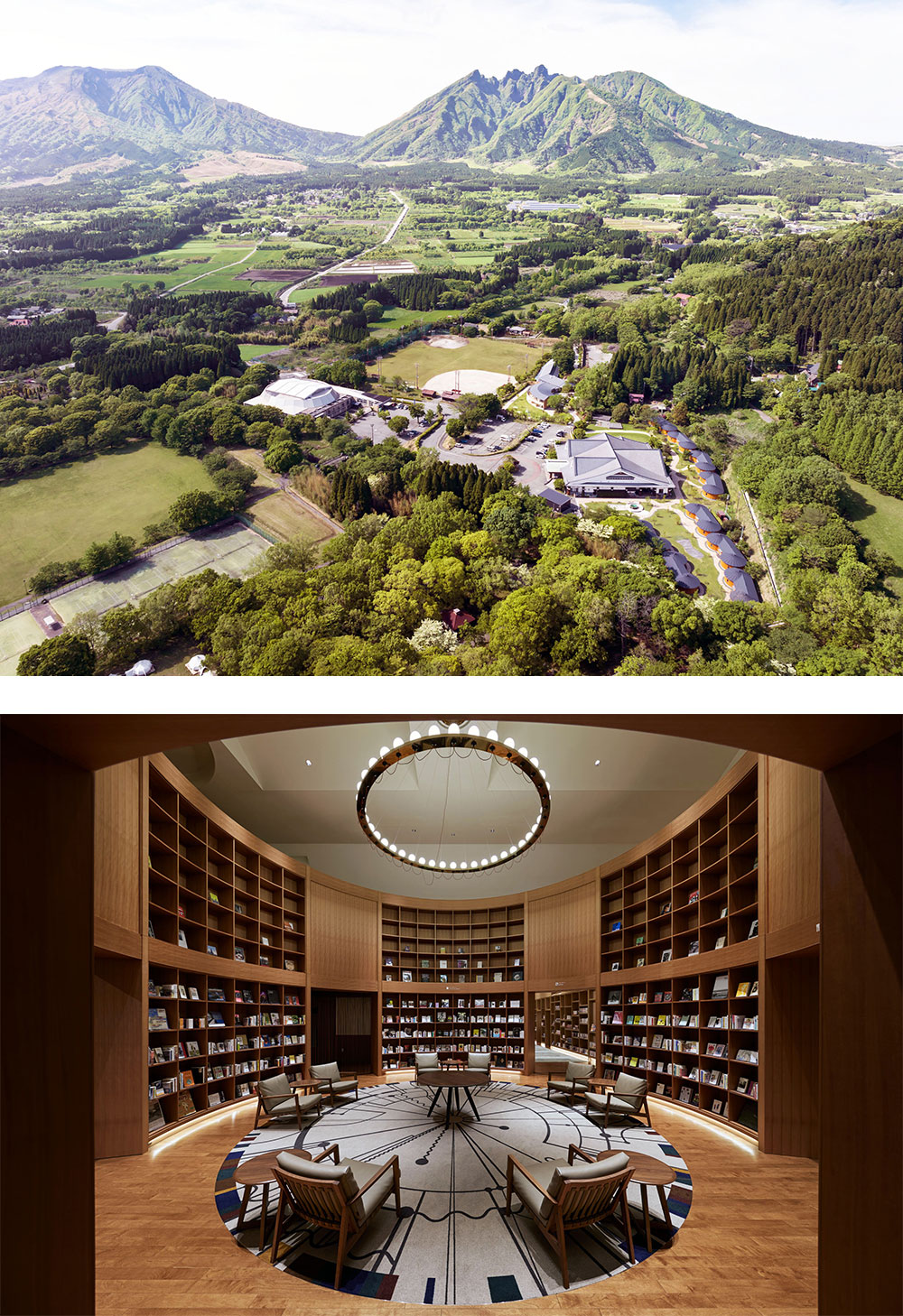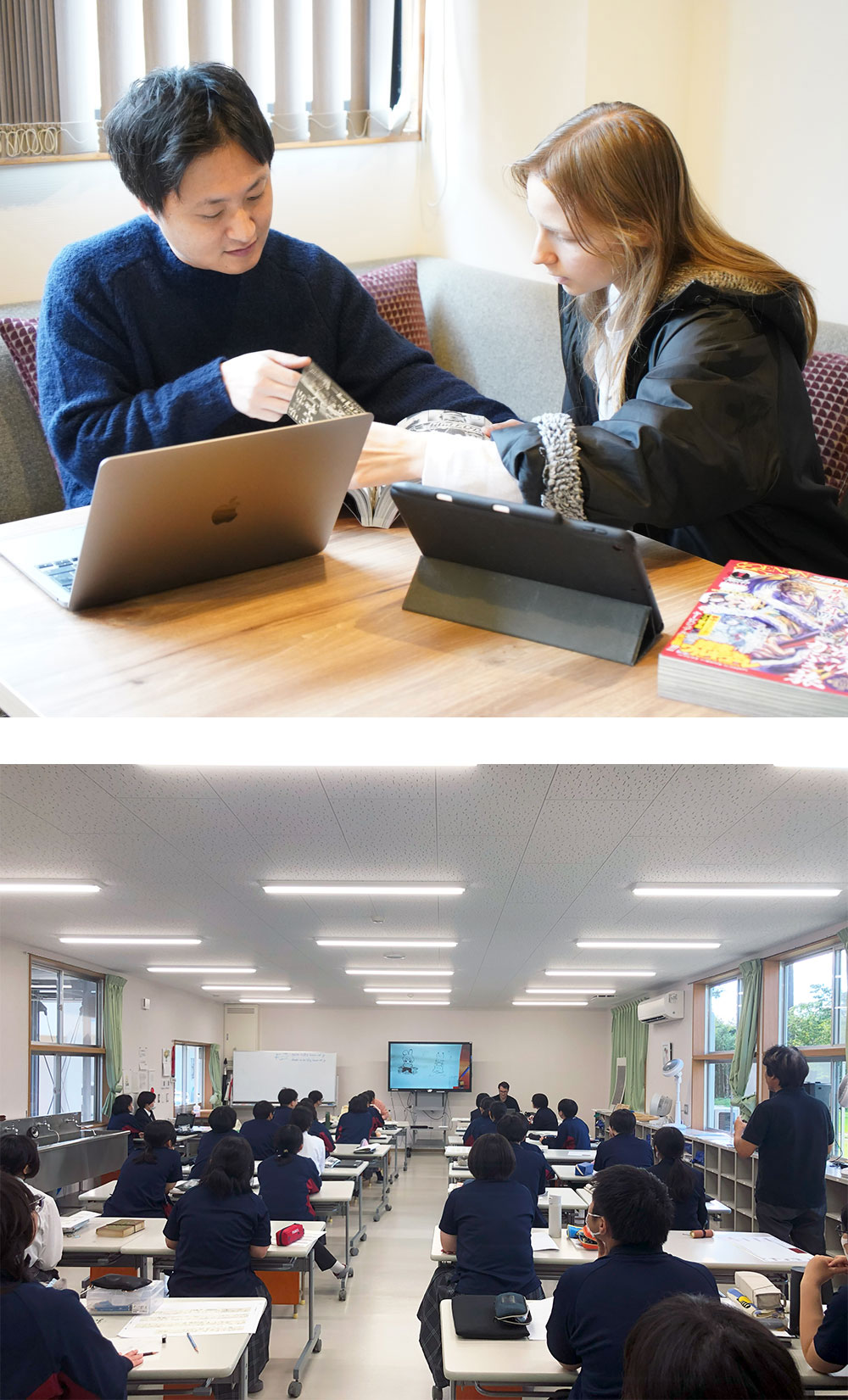
In Kumamoto, where talent from all over the world gathers
Would you like to edit your manga with us?
[SMAC! Editorial Department]
Enrico Croce(Editorial leader)
Takashi Yanaka
Takeshi Ueda
Rose

In Kumamoto, where talent from all over the world gathers
Would you like to edit your manga with us?
[SMAC! Editorial Department]
Enrico Croce(Editorial leader)
Takashi Yanaka
Takeshi Ueda
Rose
Four people from different countries and work backgrounds came together in Aso, Kumamoto because they love manga, and are working on editing manga by foreign authors and high school students. We asked him about the rewarding nature of his work and his future prospects with an eye on the world.
I applied for Kumamoto Core Mix.
Trigger

Enrico: I'm from Italy. Ever since I was in my home country, I've been into manga ``Fist of the North Star”, and this work inspired me to start studying Japanese. After coming to Japan hoping to work there, I was invited to a New Year's party by a friend who worked at Coremix. There, I met President Nobuhiko Horie (also Chairman of Kumamoto Core Mix), who told me that SMAC was the new department to be launched. I was invited by the Editorial Department (SMAC). SMAC is now in charge of overseas authors, and my work location has changed from Tokyo to Kumamoto, but the joy of being able to work on my favorite manga as an editor remains the same.
Yanaka: I joined a company that produces business books as a new graduate, and as I gained experience as an editor, I decided that I wanted to try my hand at editing manga, which I loved, so I joined Kumamoto Core Mix. When I changed jobs, I learned that manga was being studied scientifically, and I felt that there was knowledge that could only be found here. I thought that instead of being asked to do "work based on sense" that is difficult to acquire, I could learn a methodology that anyone can learn and master. My motivation for joining the company was because I thought it would give me the most ability compared to other companies. I had no hesitation in leaving Tokyo, where I had lived until then, and working in Kumamoto, as the environment was unlike any other.
Ueda: I have been producing TV programs in Tokyo for about 10 years, and joined Kumamoto Core Mix in October 2022. The reason for this was that I was from Kumamoto and wanted to return to my hometown. After returning home, I thought I would be able to use my background in production to get a job, so I took an employment exam.
Although we are a private company, we are working hard to establish the manga department of Takamori High School, a public school, and building a facility equipped with full-fledged equipment and equipment to foster overseas artists. So, I joined the company hoping that through my work here, I could give back to the place where I was born.
Rose: I had experience in translation and editing through my research as a student, so I decided to join the company because I thought it would be possible to gain more knowledge and experience in editing. Through the Manga Award, which invites works from all over the world, and the creation of works with overseas artists, I felt it was an opportunity to utilize what I had cultivated in my home country on a larger scale. I want to create connections between Japan and other countries through my favorite manga.
Company atmosphere and the appeal of Kumamoto Core Mix

--About the company culture
Enrico: Because we work in Takamori, Aso, a place far from Kumamoto city, and we work with a small number of people, our employees are very close to each other. I feel that not only the president and executives, but also staff from other departments can work from the same perspective and with the same passion.
Ueda: There is an atmosphere where everyone can be treated equally. What I really like about Kumamoto Core Mix is that everyone in other departments actively tries to get to know us, and they answer any questions I have.
Enrico: In my work, Kumamoto Core Mix and Core Mix often work together on editing. Therefore, when I transferred to Kumamoto, I was concerned that communicating remotely would be a hassle. However, once I started working, I realized that we could work together without stress. The reason behind this is that online meetings and communication using Google chat have become widespread within the company. This allows us to smoothly share information and align our minds even when we are far apart. Furthermore, Takamori has a 10Gbps optical line, and we have the equipment to make the most of it.
Rose: I think this is a company that helps its employees. They supported me, including finding a place to live. There is an atmosphere where we can help each other when we have a problem.
Yanaka: In terms of external affairs, “096k Kumamoto Opera CompanyI'm glad that the projects and projects that we're working on, including ``Kumamoto University,'' are gradually becoming recognized in Kumamoto.
Ueda: One of the attractions is that we have a staff cafeteria. Since I live alone, I tend to not eat well, but the meals at the cafeteria are very helpful because they have a wide variety of menus, are nutritionally balanced, and the buffet style allows you to decide on the amount you want.
--About working with foreign authors
Ueda: Kumamoto core mix “Artist Village Aso 096 Ward” has 10 manga artists from overseas who work together. I think one of the editor's jobs is to understand the writer's intentions, so we need to have deep communication. Although there are cultural differences, I believe that it is important to have the will to work together.
Rose: We plan events such as going on trips together, holding birthday parties, and having fun together with writers. I want to build good relationships between people and work together as a team to create good manga.
SMAC work

Yanaka: “World Silent Manga Audition"When"Coremix Kyushu International Manga AwardWe plan and manage a manga award that is open to the public. Specific tasks include determining the theme for the contest, recruiting works, public relations activities on SNS, accepting works, and first screening. The quality of submitted works is increasing year by year, and it can be difficult to decide which works to pass through the judging process. In particular, the quality has improved significantly over the past two years, and I think that applicants have developed a sense of ``we have to catch up to this level'' and are creating an environment where they can work hard together.
Enrico: Just because you pass the audition doesn't mean the serialization will start immediately, so we want to have deep communication with the writers and work together to create a good work even before their debut. We also believe that it is our mission to increase the number of people who draw manga. The number of aspiring writers is increasing all over the world, so this is a job with a bright future.
Ueda: At the Manga Department of Kumamoto Prefectural Takamori High School, which was established in 2023, Coremix provides classes to students once a week. When the editor and president, Horie, the president, Shuichi Mochida, and the manga artist Jun Tomizawa teach, they assist in the progress of the class and manage the progress of the assignments given to the students. In an environment where all the students around us are drawing manga, we are also encouraged by seeing them grow positively while stimulating each other.
Yanaka: All the students at Takamori High School are trying new things. I feel that the manga is very appealing, with cinematic expressions that delicately touch people's hearts, which is completely different from the manga expressions that our generation is accustomed to. In addition to classes in the Manga Department, SMAC also supports the extracurricular "Manga Club." The Manga Club holds an event called the "Monthly Award" every month, which is judged by Coremix. We have 11 divisions, including not only those related to manga such as the character design division and story/plot division, but also the image board division and art painting. Have students choose their favorite theme and apply. Basically, students in each department are free to create their own creations, but if they have any questions or consultations, we editors work with the art teachers to respond. Once a month, we invite students from the Manga Club to the Artist Village, where we carry out activities that can only be done here.
Enrico: In addition to manga editing, I also work on ``pomodoroI edit, interview, and write for a free magazine called ``. This is a medium to convey the charm of Kumamoto. By conducting our own interviews and writing articles, we are improving our interviewing and writing skills, which allow us to accurately understand the intentions of others, and expanding the range of our editing skills. I also feel that being able to experience interacting with a print shop will be useful when SMAC works on paper comics in the future.
--Rewarding work
Enrico: I think one of the appeals of foreign artists is that they have cultures and experiences that domestic artists have never had, and are able to create original works. I feel that whether we can fully draw out that potential will have a large impact on the future development of SMAC.
Ueda: Number one is definitely creating works with overseas artists. By working together, you can create something that exceeds your imagination and that you would not be able to create on your own. There is a special joy when a good piece of work is produced after going through that process.
Rose: We support talented writers so that they can work without hesitation. Although there are some tasks that are not directly involved in the creation of works, I can feel that I am contributing to the artist's power.
Yanaka: SMAC's future goal is to produce hit serials. And monetize your business. People all over the world are now becoming aware of the manga content we provide, so if we can generate revenue from this, I think we can attract even more people. In this way, I would like to aim to become the center of a global manga movement.